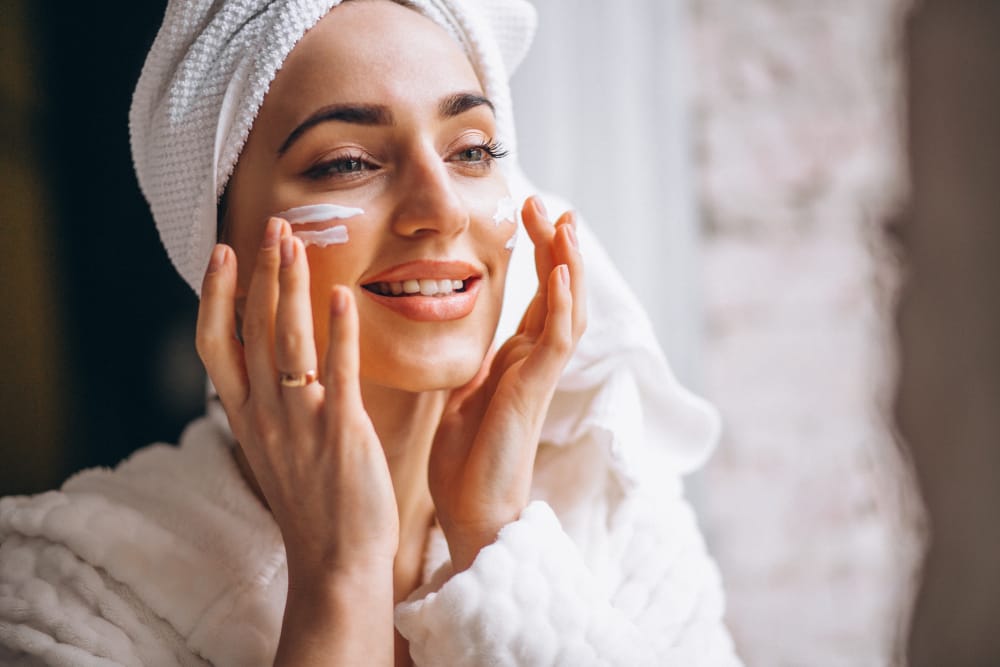Last Updated on March 1, 2024
Keeping your skin hydrated is essential for keeping it healthy and glowing. Drinking plenty of water and eating a balanced diet with fruits and vegetables are key components to keeping your skin looking its best. Regular exfoliation and moisturizing are also key to maintain skin glowing and fresh.
Tips to Keep Skin Glowing and Fresh
Understanding Your Skin:
Before diving into skincare routines and products, it’s essential to understand your skin type. Whether you have oily, dry, combination, or sensitive skin, tailor your regimen accordingly. This personalized approach ensures that you’re providing your skin with the care it needs without exacerbating any existing issues.
Hydration Is Key:
One of the fundamental principles of maintaining glowing skin is hydration. Drinking an adequate amount of water throughout the day helps flush out toxins and keeps your skin hydrated from within. Aim for at least eight glasses of water daily to support your skin’s natural moisture barrier and promote a healthy glow.
Cleanse Gently:
Effective cleansing is vital for removing dirt, oil, and impurities that can dull your complexion. However, harsh cleansers can strip away your skin’s natural oils, leaving it dry and irritated. Opt for a gentle, pH-balanced cleanser suited to your skin type, and cleanse twice daily to keep your skin clean and refreshed without causing damage.
Exfoliate Regularly:
Regular exfoliation is key to achieving smooth, radiant skin. By sloughing off dead skin cells, you reveal fresher, more youthful-looking skin underneath. Choose a gentle exfoliator with natural ingredients like sugar or jojoba beads and use it 2-3 times per week to maintain a healthy glow and prevent clogged pores.
Nourish with Antioxidants:
Antioxidants play a crucial role in protecting your skin from environmental damage and premature aging. Include antioxidant-rich foods into your diet, such as berries, leafy greens, and nuts, to support your skin’s natural defenses from within.
Additionally, look for purifying skincare products containing antioxidants like vitamin C and E to enhance your topical skincare routine, such as the Cleansing Foaming Gel from Evidens de Beauté.
Moisturize Daily:
Regardless of your skin type, moisturizing should be a non-negotiable step in your skincare routine. Choose a lightweight, non-comedogenic moisturizer formulated with hydrating ingredients like hyaluronic acid or glycerin to lock in moisture without clogging pores. Apply moisturizer morning and night to keep your skin soft, supple, and glowing.
Get Adequate Sleep:
Quality sleep is crucial for skin repair and rejuvenation. Aim for 7-9 hours of uninterrupted sleep each night to allow your skin cells to regenerate and repair damage from environmental stressors. Invest in a comfortable pillowcase made of silk or satin to prevent friction and minimize the risk of sleep lines and wrinkles.
Practice Stress Management:
Chronic stress can wreak havoc on your skin, leading to inflammation, breakouts, and dullness. Incorporate stress-reducing activities into your daily routine, such as yoga, meditation, or deep breathing exercises, to promote relaxation and maintain a radiant complexion.
What are the Things to Avoid for Glowing Skin?

Overexposure to the Sun:
Prolonged exposure to harmful UV rays can lead to sunburn, premature aging, and an increased risk of skin cancer. Always wear sunscreen and protective clothing when spending time outdoors and avoid peak sun hours when the sun’s rays are strongest.
Smoking and Excessive Alcohol Consumption:
Smoking damages collagen and elastin, leading to wrinkles and dullness. Similarly, excessive alcohol consumption dehydrates the skin and can exacerbate conditions like rosacea and acne. Limiting or avoiding these habits can help maintain a healthy complexion.
Poor Diet and Dehydration:
A diet high in processed foods, sugars, and unhealthy fats can contribute to inflammation and skin issues like acne and dullness. Additionally, dehydration can lead to dry, lackluster skin. Opt for a balanced diet rich in fruits, vegetables, lean proteins, and healthy fats, and drink plenty of water to stay hydrated.
Harsh Skincare Products and Over-Exfoliation:
As mentioned, using harsh cleansers, abrasive scrubs, or over-exfoliating can strip the skin of its natural oils and cause irritation. Choose gentle, non-comedogenic products suited to your skin type, and exfoliate no more than 2-3 times per week to avoid damaging the skin barrier.
Touching Your Face Frequently:
Touching your face can transfer bacteria, dirt, and oil from your hands to your skin, leading to breakouts and irritation. Avoid touching your face unnecessarily, and be mindful of keeping hands clean, especially before applying skincare products.
Ignoring Skin Concerns:
Ignoring signs of skin like irritation, inflammation, or changes in texture can exacerbate underlying issues and prevent your skin from looking its best. Pay attention to your skin’s needs and seek professional advice if you notice persistent problems or concerns.”

